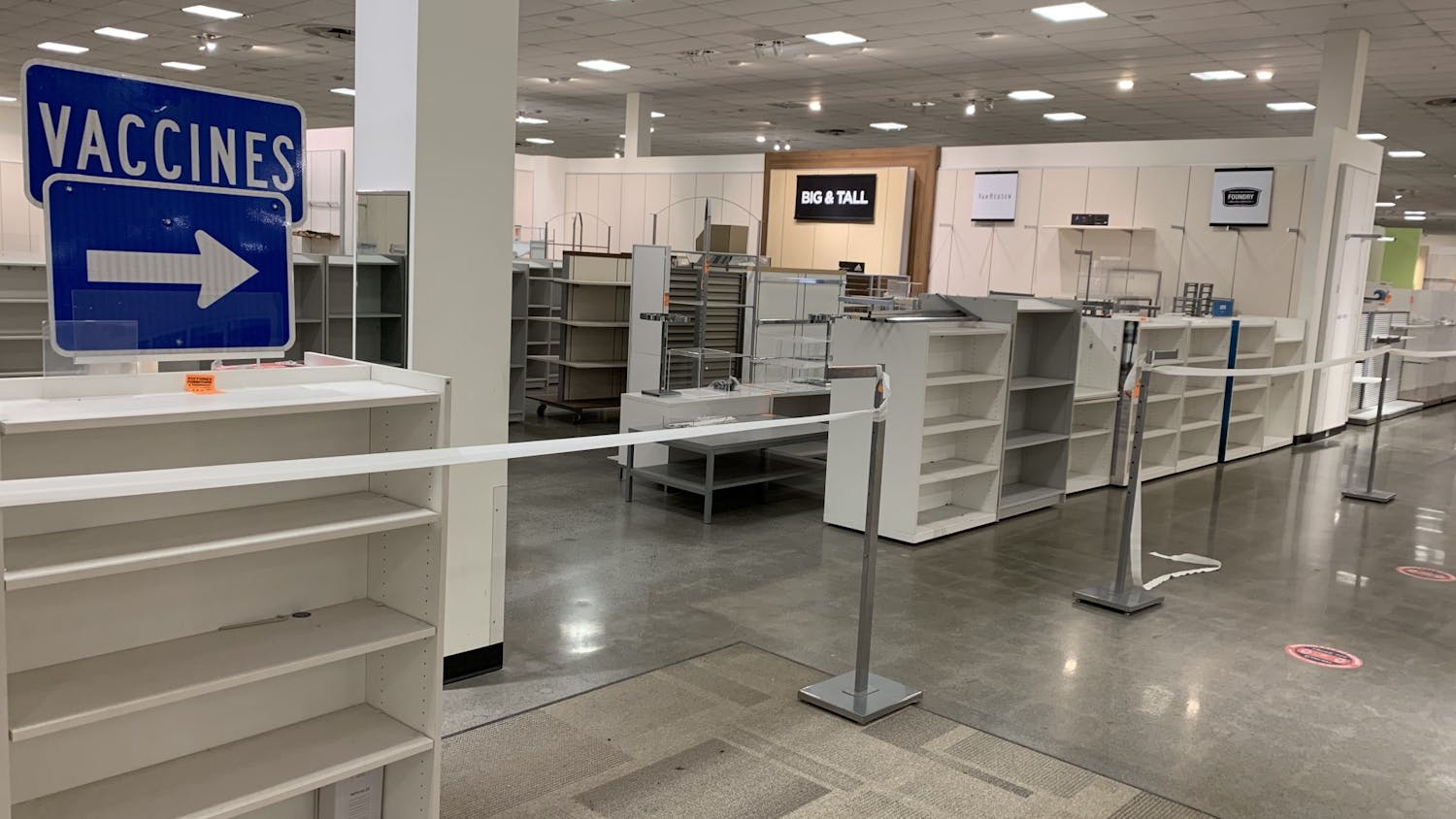While New Hampshire will expand vaccine eligibility to non-residents on April 19, some students have already tried to secure their doses. However, the process has proven unpredictable, with differing practices among various vaccination sites muddying students’ understanding of their eligibility.
Bamlak Messay ’23, who is employed by Geisel Medical School and Dartmouth Dining Services, said she scheduled an appointment at the West Lebanon J.C. Penney vaccination site with two friends who are also employed by the College. All three of them brought letters from Dartmouth’s Student Employment Office confirming their employment — Messay and one of her friends also brought their W-2 forms — as well as letters from the Office of Residential Life confirming their on-campus residency.
When Messay and her friends arrived at the J.C. Penney, Messay said they were approached by a police officer and asked if they had New Hampshire IDs. When they said they did not, the officer asked them to wait outside the line. Nearby, Messay said, was a sign stating that W-2 forms and pay stubs were sufficient proof of residency.
“It was very clear,” she said. “The forms were in our hands.”
But the students were told that their documents were invalid, and were turned away. Messay recalled one national guardsman saying that “the College could not have given a more false sense of hope than those letters.”
After calling ORL, the Student Employment Office and the College Health Service and being told that there was nothing the offices could do, the students drove back to campus, Messay said
Student Employment Office senior program manager Kari Jo Grant wrote in an email statement that the office received “dozens” of student requests for letters verifying college employment. On April 7, the Office sent out personalized letters verifying the employment status and New Hampshire payroll mailing addresses of student employees who had been paid in the past 60 days.
According to Grant, the Office “has not heard directly from individual students” about their experiences being turned away from vaccination sites, but is “aware that each vaccination site operates under the guidance provided by the state.”
New Hampshire National Guard master sergeant Marc Coleman, who helps oversee the operations of the J.C. Penney vaccine distribution site, explained that officers have been directed by the state to only accept W-2 forms with “legal New Hampshire addresses,” which excludes dorm building addresses, PO boxes and voter registration form addresses.
Coleman estimated that the J.C. Penney site has “seen 70 to 100 college students turned away because they didn’t have proper proof of New Hampshire residency.”
Many students who have been able to secure access to a vaccine appear to have done so through a combination of luck and determination.
Meggie Bond ’24 visited the J.C. Penney site on April 10 in hopes of receiving her second dose of the Pfizer vaccine. She said she received her first dose at home in Ohio during spring break while volunteering at a vaccine distribution site in Cleveland.
Bond, who works as a research assistant in the physics department, brought a pay stub, a letter verifying employment from the Student Employment Office and her Ohio photo ID. When she was told that her documents “weren’t valid,” she drove back to campus.
“I was extremely frustrated, because friends of mine who had the same credentials who went in a day before or even the same day [as me] had gotten the vaccine. It had worked for them,” she said.
Bond decided to go back to the J.C. Penney — this time with a letter from the ORL confirming her on-campus residency — and was denied again. When a national guardsman confirmed that Bond’s documents did not verify her eligibility, she said she broke down.
“I started sobbing. I didn’t want to be annoying, but the next appointments available were in mid-May. And that was a month away,” she said.
The national guardsman she was speaking to eventually asked how she had first been vaccinated and followed up with questions about her volunteering experience, according to Bond. After Bond showed proof of her name on the Cleveland vaccine distribution site volunteering schedule, she said the officials let her receive a second dose.
“What upset me the most was that [people I knew] were texting me ‘go to the Walmart, the Walmart lets everyone get [the vaccine],’” she said.
A spokesperson for the West Lebanon Walmart declined to share information about vaccine distribution at its pharmacy.
Eleanor Clark ’24, who successfully received her vaccine at J.C. Penney, provided her Hinman Box number to a national guardsman as a legal address. She said she feels that she “lucked out” to have gotten through.
Trace Hilbun ’24 drove an hour away from campus along with two friends to receive a vaccination at the Mid-State Health Center in Plymouth, New Hampshire, where he said his vaccine administrator “hesitated” because she knew that he and his friends were college students.
“I could tell that the [administrator] knew she wasn’t supposed to give us vaccines, but we were able to get them anyway,” Hilbun said. The administrator accepted Hilbun’s New Hampshire voter registration record, his friends’ out-of-state photo IDs and all the students’ letters from the ORL confirming their on-campus residency.
Some students have taken other measures to gain vaccine approval. One member of the Class of 2023, who asked to remain anonymous, altered one of his documents in an attempt to demonstrate residency before receiving the Pfizer vaccine at the J.C.Penney site. Before going to the site, he edited a bank statement using Microsoft Word to change his Hinman address to his dorm’s physical street number.
The national guardsman reviewing his documents “did not question the validity of the document, since it appeared legitimate,” the student said, adding that he told the guard he lived off campus when asked whether he was a Dartmouth student. The student was approved and able to receive a dose of the vaccine.
For some students, however, receiving the vaccines has been a straightforward process.
Manu Onteeru ’24, who received the Johnson & Johnson vaccine through the Upper Valley Public Health Council’s equity vaccination clinic on March 27, said he was asked only for his Dartmouth ID. He added that the only people who he was aware of being turned away from the site were those who were on the waitlist and those who had not pre-registered.
Manny Rodriguez ’23, who received the Pfizer vaccine at Dartmouth-Hitchcock Medical Center’s general clinic that opened on April 10, had a similarly easy experience getting vaccinated. He said he brought a letter verifying on-campus residency from the ORL, a letter from the town of Hanover verifying his New Hampshire voter registration, a pay stub from the College verifying his employment at Novack Cafe and an out-of-state photo ID.
Ultimately, the official at the check-in table asked only for the photo ID, and Rodriguez was automatically scheduled to receive his second dose in May.
“It was a quick in-and-out,” Rodriguez said.
According to an email statement from vice president of clinical operations at DHMC Mary Evanofski, the vaccine clinic at DHMC requires residents to show the identification documents outlined by the state: a New Hampshire driver’s license, a payroll document from within the last 60 days showing a legal New Hampshire address or a government-issued payment dated within the last 60 days.
“Dartmouth-Hitchcock Medical Center is operating as an open point of distribution for the state of New Hampshire and requires exactly the same identification as the state,” Evanofski wrote.




